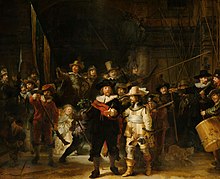Passion (1982)
| Movie | |
|---|---|
| German title | passion |
| Original title | passion |
| Country of production | France , Switzerland |
| original language | French |
| Publishing year | 1982 |
| length | 87 minutes |
| Rod | |
| Director | Jean-Luc Godard |
| script | Jean-Luc Godard |
| production | Alain Sarde |
| music | Pieces by Mozart , Beethoven , Dvořák , Fauré , Ravel and Ferré |
| camera | Raoul Coutard |
| cut | Jean-Luc Godard |
| occupation | |
| |
Passion is a French-Swiss feature film by director Jean-Luc Godard from 1982. The individual plot fragments puzzles the audience. Thematically, Godard is on the trail of the secret of painting and examines the light and composition of several paintings by Rembrandt, Ingres, Goya and Delacroix.
action
A film is being made in a French film studio in which famous paintings are recreated. The extras, costumed like the painted people, remain motionless in their respective poses while a film camera on a crane moves around them. Directed by the Pole Jerzy, who is often not satisfied with the light and demands that one keep looking for the best artistic realization. His employees include the Hungarian assistant director László and the machinist Jean-François. The team is housed in a hotel run by the couple Hanna, a German, and Michel. Your marriage is in crisis. Michel also owns an industrial company next door. The young worker Isabelle was employed there until Michel quit her after a dispute over working conditions.
Isabelle attends a union meeting to discuss ways to get her reinstated together. Jerzy is fascinated by Hanna and makes test photos in which he strokes her face. Jerzy has nothing to do with László's plans to go to Hollywood. After an extra has got out, the deaf and mute niece Michels takes over her job, in which she portrays a naked bather, among other things. Isabelle insists on a right to work and goes to the factory, but Michel lets the police take her away. She talks to Jerzy about her problems and lets him deflower. When the days of shooting are over, those involved scatter in all directions.
criticism
The Fischer Film Almanach 1984 pointed to the characters' illnesses, such as Michel's cough or Isabel's stutter, and assumed that Jerzy, Lászlós and Hannas were homeless. They are "so broken that they constantly hit each other, they run around hectically", the film is hectic and everything is unstable. Classical music, on the other hand, creates calm. “A difficult film if you want to“ understand ”it, an easy one if you entrust yourself to the intensity of the individual scenes.” For film-dienst , Passion is “intellectual avant-garde cinema”, “more cumbersome than Godard's work from the 1960s and more faceted ”. The film is "full of cryptic references, sometimes surrealistic, sometimes satirical-burlesque, then again relational world theater or absurd comedy." The director argues "against the gigantic narrative cinema [...] for the variety of impressions and against clear determinations."
literature
- Harun Farocki: Godard, Passion ; originally published in: Filmkritik from July 1983; republished in: Harun Farocki: I've had enough! , Texts 1976–1985, Writings Volume 4. Neuer Berliner Kunstverein / Verlag der Buchhandlung Walther König, Berlin / Cologne 2019. ISBN 978-3-96098-226-5 . Pp. 413-424.
- Kaja Silverman / Harun Farocki: Moving Images ; in: Speak of Godard . Vorwerk 8, Berlin 1998. ISBN 3-930916-18-5 . Pp. 196-224.
Web links
- Passion in the Internet Movie Database (English)
